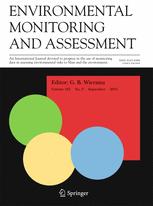 An environmental journal is retracting an article about the risks of pesticides to groundwater after determining it contained data that “the authors did not have permission (implicit or explicit) to publish.”
An environmental journal is retracting an article about the risks of pesticides to groundwater after determining it contained data that “the authors did not have permission (implicit or explicit) to publish.”
According to the retraction note in Environmental Monitoring and Assessment, the paper said the data came from a non-author’s PhD thesis, but it’s not there. Those mysterious data were used to validate a model for pesticide exposures, described in an excerpt from the abstract:
The model developed can help to identify the temporal risk from pesticides to groundwater and guide regulators in highlighting at-risk periods, therefore allowing more focused monitoring programmes.
The paper,”Development of a screening tool to assess the temporal risk of pesticides leaching to groundwater using the source, target, vector approach. An Irish case study for shallow groundwater,” was published earlier this year and has not been cited, according to Thomson Scientific’s Web of Knowledge.
Here’s the retraction note in full:
This article has been retracted by the Editor-in-Chief because the authors did not have permission (implicit or explicit) to publish the data used to validate the model, which was unpublished and was not contained in the cited unpublished PhD thesis by Sarah McManus (Trinity Centre for the Environment, Dublin, Ireland). Given the copyright and authorship issues involved, the Environmental Monitoring and Assessment article in question is being retracted. The authors apologize for their negligence.
We contacted the Editor in Chief of the journal to ask where that data did come from, if not from the thesis. Joan Robinson, Corporate Communications Manager at Springer, got back to us:
In answer to your question whether the data came from McManus or somewhere else: The data came from McManus.
The editor-in-chief of Environmental Monitoring and Assessment was notified of the issue by a colleague of Sarah McManus.
We’ve contacted McManus, who appears to still be a student at Trinity College Dublin, and the authors of the paper, Herve E. Labite and Enda Cummins at University College Dublin. We’ll update if we hear back.
Update, 10/29/2015:
We have received a statement from Labit, Cummins, McManus, and her supervisors:
This was a joint project where data was exchanged between the students at different time points. The data of McManuswas provided to Labite for use only in a project report to the research sponsors, however there was genuine oversight on the part of the paper authors over terms regarding its use in a publication. In consultation with project partners, the issue was raised by Dr. Cummins with the Editor In Charge, seeking a timely solution. All avenues were investigated including the preference to add the student and supervisors to the author list, however these researchers had no input to the data analysis and interpretation, and the journal did not allow for authorship changes in their publication terms and conditions. Hence, the only alternative was a retraction. This was an unfortunate event where it is accepted there was genuine error and with no malice intent. There remains a good working relationship between all parties involved.
This is an agreed statement on the matter from Dr H. Labite, Dr E. Cummins, Dr S. McManus, Dr K. Richards, Dr C. Coxon.
Hat tip: Rolf Degen
Like Retraction Watch? Consider making a tax-deductible contribution to support our growth. You can also follow us on Twitter, like us on Facebook, add us to your RSS reader, and sign up on our homepage for an email every time there’s a new post. Click here to review our Comments Policy.
Hmm – this is a bit of a strange one. If the data was from the student (but miss-cited ie not from the PhD) why did they not just ask the student and put them on the paper?
I would have thought this could have been done in the form of a amendment to the published paper rather than requiring a retraction…